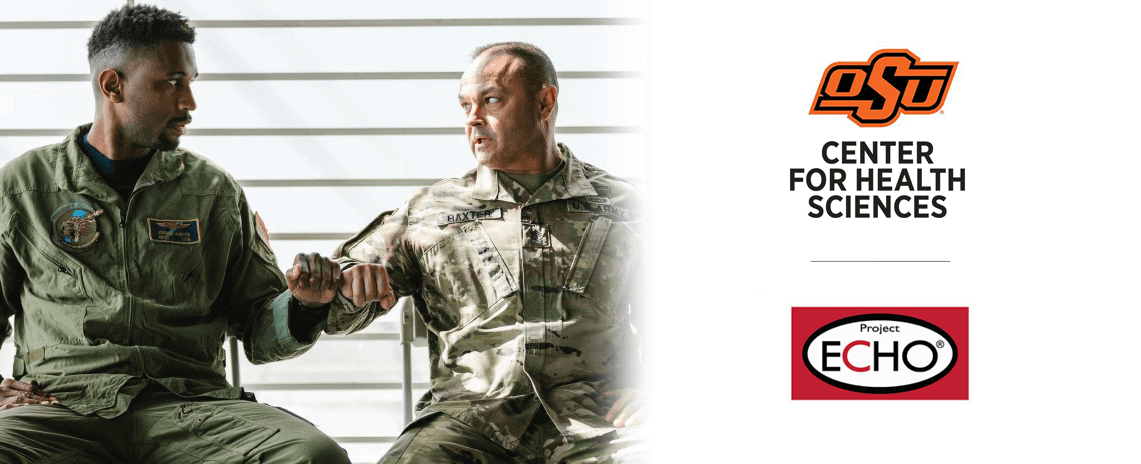Veteran Care
Preparing Health Professionals for the Unique Needs of Veterans
Veterans face unique challenges that are often overlooked in the health care environment. Understanding the needs of Veterans and their military culture and experiences provides valuable insight into care planning and encourages Veteran’s to seek health care more often.
The Veteran Care ECHO Program curriculum is designed for health professionals who want to learn how to support and better care for Veterans. Through the Project ECHO virtual platform, participants learn about military experiences and the impact on a Veteran’s physical and mental health. Sessions are held once a month on the first Thursday of the month from 12 to 1 p.m. CT.
Earn CMEs
Veteran Care sessions are approved for the following CME credit types:
- AOA Category 1-A
- AAFP Elective Credit
- Oklahoma State Board of Licensed Social Workers (OSBLSW)
- State Board of Behavioral Health Licensure (BBHL)
- Oklahoma State Board of Licensed Alcohol and Drug Counselors (BLADC)
What Does the Veteran Care ECHO Program Offer?
- Up-to-date best practices in Veteran-care for non-VA providers in rural communities
- Guidance on integrating Veteran-care into non-VA practice
- Increase provider understanding of the value of cultural awareness when treating Veterans
- Address a wide range of Veteran-specific healthcare issues such as environmental exposures, military sexual trauma, mental health, women’s health, and so on
- Real-time clinical review of cases submitted by participants
Why Veteran Care?
- In 2014, Oklahoma had the highest suicide rate among Veterans aged 18-34 years old.
- The suicide rate for Veterans was 1.5 times higher than the rate of non-Veteran adults.
- In Oklahoma alone there are roughly 300,000 Veterans, making up around 10% of the total population. Of those Oklahoma Veterans, nearly 40% live in rural areas.
- Over one million Veterans are currently living with substance use disorder.
- 80% struggle with alcohol abuse
- 25% struggle with illicit drugs
- 7% struggle with both alcohol and drugs
- An estimated 15-35% of Veterans with chronic pain have post-traumatic stress disorder (PTSD).
- Since 2000, more than 370,000 US service members have been diagnosed with traumatic brain injuries (TBI).
Topics
Sessions are held once a month on the first Thursday of the month from 12 to 1 p.m.
CT.
Topics include but are not limited to:
- Military Culture
- Moral Injury
- Ask the Question
- Tribal Healthcare
- Transitioning to Civil Life
- Treating Chronic Pain
- Understanding Health Claims & Benefits
- Effects of Sustained Increases of Adrenaline and Cortisol
- PTSD
- Physical Effects of Homelessness
- Military Sexual Trauma
- Employment
- Wellness for the SMVF Population
- Health Benefits of Social Connection
- Treating SUDs
- SMVF Education Benefits and Why It’s Important to Health
- Amputation Treatment
- Working with the Deaf and Hard of Hearing
- Overcoming Stress and Anxiety for Veterans
- Reacclimating from Deployments / Extended Absences
- Overcoming Stress
- Healthy Living, Benefits of a Health Diet and Exercise
- Depression and Suicide Prevention
- Traumatic Brain Injuries
- Women Veteran Issues
- Anger, Violence, and Abuse
- Hazardous Exposures
- Long-term Healthcare
- Memory Care
- End of Life Rights and Rituals
Team
Christi Sherrill, MPH, MS
christi.sherill@okstate.edu
Program Manager - Oklahoma Flex Rural Veterans Health Access Program
Hub Team - OSU Project ECHO Veteran Care Line
Data Coordinator/Evaluator - Muskogee Opioid Response Coalition
Adjunct Instructor - College of Education & Human Sciences
Hardesty Center for Clinical Research & Neuroscience
OSU Center for Health Sciences
Heidi T. Pham, LCSW
Community Engagement & Partnerships Coordinator
Suicide Prevention Team
Eastern OK VA Health Care System
Felicia D. Cummings, MSW, LCSW
Veteran Affairs Health Care System
Senior Social Worker Suicide Prevention
COL/Ms. Lindy I. White, LPC
Division Chief, Health and Wellness
Oklahoma National Guard
Matthew Condley, MS
Prevention Specialist
Tulsa Health Department
Casey Moyer
ECHO Coordinator
Tara Jackson
Project ECHO Director
Jade Goodson
Assistant Director

